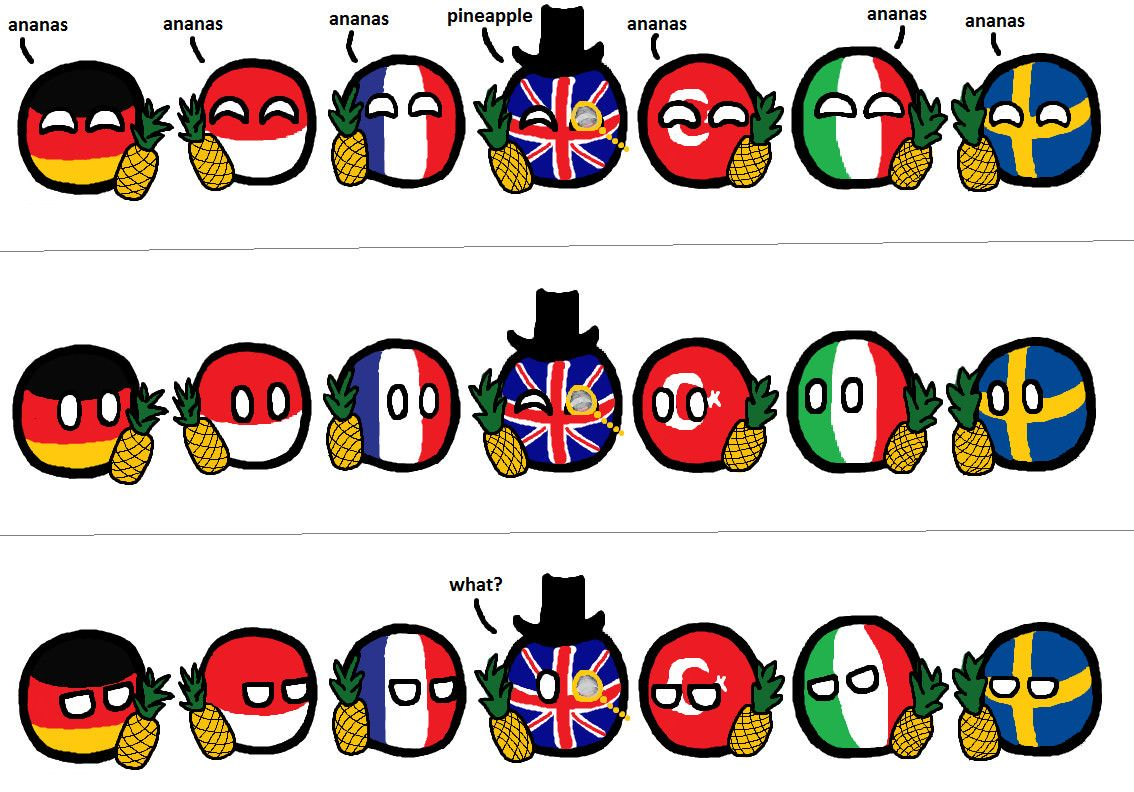In a lot of languages the word for apple used to refer to all kinds of fruits, particularly new ones from more or less exotic lands. Pineapples also don’t look much like apples, do they?
Pomme de terre (IIRC) is a sad version of a underground apple.
Pineapples look like a pinecone but with a sweet fruit inside. Makes sense to me.
Then again horse apples, i.e., horse shit doesn’t taste great at all. Then again, again: horse apples, the Osage Orange fruit, are inedible. Osage Orange is neither an apple or orange tree.
English 'tis a silly language.
I pronounce is Pin-eap-ples, just to avoid this very thing.
But, at least they’re fruit.
if you think ground apples isn’t an apt description, you’ve never eaten potatoes raw.
Here’s something else to gnaw at your brain: “corn” used to be a generic term for any cereal grain, and now only refers to the one group of crops. Also we now (mostly) only use “cereal” to describe the stuff you have for breakfast with milk. Which used to be just shitty puffed grains but now also includes all kinds of flakes and processed nonsense.
The English for “ananas” is “pineapple”, did the English really think they grew on pine trees?

It’s their superficial resemblance to pinecones.
Fun fact: no one knows why us squid are called that in English and no other language calls us anything like that.
It’s a bit cherry picked, but only a bit, since there are a few languages that just copied the English word later on.
Japanese and Korean come to mind.That actually makes it funnier to me because ananas would be easier to pronounce in Japanese vs pineapple. Ananansu(u is silent) vs Painappuru.
Oh absolutely!
They just had no ananas exposure beyond that from the Americans.
deleted by creator
Spanish conveniently missing
And anthough it might be correct, I’ve never head anyone say mañana in Basque. We just use piña(pinia)
Here’s how the creation of the graphic went:
- Create a binary
- Ignore vast majority (of people working with subject)
- slap together chart, cherrypicking
- Gloat
Probably to avoid confusion with bananas?
Oh you can’t even imagine the amount of times I put a pineapple up there.
Here i go, imagining again.
Is english known for trying to avoid confusion?
“Apple” is Old English for “fruit”, not specifically apple.
And apparently “pineapple” for the tropical fruit predates “pine cone”, OE used “pine nut”.
Earliest use of “pineapple” is 14th century translation for “pomegranate”.
Why is this weird? “Apple” used to be the generic word for fruit in many different languages, it wasn’t until recently that it took on the meaning of a specific type of fruit. I don’t think calling potatoes “fruit of the earth” is at all strange. The English equivalent to this is the word “pineapple” – a fruit that kind of looks like a pine cone.
italian tomatoes have entered the chat and agree with their golden apples.
“apple” used to be a generic term for fruit. So it’s actually “fruit of the earth”, the French are poetic like that
“apple” used to be a generic term for fruit.
Oh, that explains the myth that Adam and Eve at an apple, when a specific fruit is never mentioned.
That’s a bingo.
Great! Can’t have myths about random fruit in this otherwise totally valid, reasonable and trustworthy story about a woman that was made from a man’s rib and talked to reptiles.
If a narrative is not literally true, does that mean it has no truth value?
What is “truth value” supposed to mean?
Sorry, I wasn’t explaining myself well.
Just because a story isn’t factually true, doesn’t mean that it has no value, or negative value. There are other types of values which can supersede factual value:
- aesthetic
- symbolic
- ethical
- didactic
Truth isn’t always about facts. Sometimes factual statements can be used as a weapon of deceit.
There are other types of value, of course. It’s just funny to specifically call the apple out for being a myth. The entire story is a myth, so they could have made it a pomelo for all I care.
It also explain why we here in the Nordics call oranges “appelsin”, as in a “Chinese apple”.
Same in Dutch: sinaasappel
But… we’re talking French and Adam and Eve was written in Hebrew. Is it the same for Hebrew?
Hebrew used a generic word for fruit, all languages translated that word as their version of apple which was generic at the time, and then much later, all languages changed the meaning of their word for apple, it’s not specific to French. The use of apple for one specific fruit is fairly recent - more recent than the King James Bible, even.
I don’t know what the word in Hebrew is and if it also changed its meaning since then, though.
Literally yes, ground apple is potato in hebrew
Also apples used to be small, tart, and acidic.
You wouldn’t eat them as a dessert but as a basis for brewing alcohol.
It’s wild how much fruits changed in recent times.
So much so that most zoo are stoppimg giving them to animals and switched to more leafy greens. They have gotten so sugary that they promoted tooth decay and obesity.
Than you, I was going to say modern apples have a taste and texture nothing like apples when this name was created.
isn’t apple used in many languages as a generic term for fruit?.. it’s not like pineapple has anything to do with apples either.
Case in point: Pomegranate. pomme = apple or more generically fruit, granate = grenade. It’s a shrapnel apple. Apt description if you’ve ever eaten one.
Counter point:

Ananas
Bananas
:-/
In Castellano (Spanish from Spain), it’s called piña.
Spanish in other places, too—piña colada, anyone?
The takeaway here is, the rest of the world uses different words than the continents where it comes from
You can’t include English in any rational discussion about languages. It breaks every rule, and isn’t one language, but a pidgin of three or four. It’s a bastard of a language, and what-about-ism involving English is so trivial it’s not worth debating. You can always find a worse example of any language linguistic stupidity in English.
The problem with defending the purity of the English language is that English is about as pure as a cribhouse whore. We don’t just borrow words; on occasion, English has pursued other languages down alleyways to beat them unconscious and rifle their pockets for new vocabulary.
Writer James D. Nicoll
Is this a copypasta?
deleted by creator
The James Nicoll quote is better - use that instead.
Recently I watched an press event with a Canadian politician, who was switching between French and English as we must sometimes. He was talking about a bag of apples (which his colleague was holding) costing a stupid amount of money. He made the mistake of saying a bag of potatoes, which i found fucking hilarious as I speak both languages and understand the mistake. Unfortunately for him, the people criticising him were morons and were like WHY WOULD HE SAY POTATOES IS HE STUPID.
Franglais is my language of choice after several drinks in any French speaking country. I am from Jersey, New, so it’s the best I can do with my education.
Four twenties ten and seven. That’s four goddamn numbers in a row!
The franglais in me screams that neufant ought to be acceptable. I’m sure Canadians are saying it, who knows what language they really speak.
American: “Have french people never eaten a good apple?”
Frenchman: “Have Americans never enjoyed a tasty potato?”
Potatoes are indeed tasty. Some varieties are even sweet-ish. I can’t say I’ve had potatoes that were as sweet as apples, without the addition of a lot of sugar.
I grew up on a farm along a small river called the Pomme De Terre and we didn’t grow potatoes. But we did have a potato lifter to harvest the 1/2 acre or so we would grow for our own consumption.
There was also a small county picnic area in the middle of nowhere by the same name. And no one knew why it was there.
So you had a potato lifter that just sat there, still and silent, in case you ever decided to grow 1/2 acre of potatoes?
Yeah, pretty much. It was a converted horse drawn implement so it was quite old and pretty worn. It did work, but us kids still had to walk behind it to pickup the potatoes it missed.
And when you could muster a small army of 10 kids from 3 families, well you maybe didn’t need a potato lifter so much.
oh, I see you meant you didn’t grow potatoes for the market
Ah my bad. Back in those days, having a small one row potato lifter was not unusual for a farm where I grew up. Potatoes were a staple food because they could be stored easily until the next harvest. You would grow a half acre, sometimes more just for your own needs. Along with a lot of other vegetables to be home canned or stored.
Self sufficiency is important when you were poor.
Let the language which is without sin cast the first stone.
::: lanzars una piedra :::
Not just French
Well Italians call tomatoes golden apples
While having two words for blue because “they look different”
And orange is a Chinese apple
I refer to my skillet as my “fire apple”
Grosse Pomme is New York
Hans Grosse






















